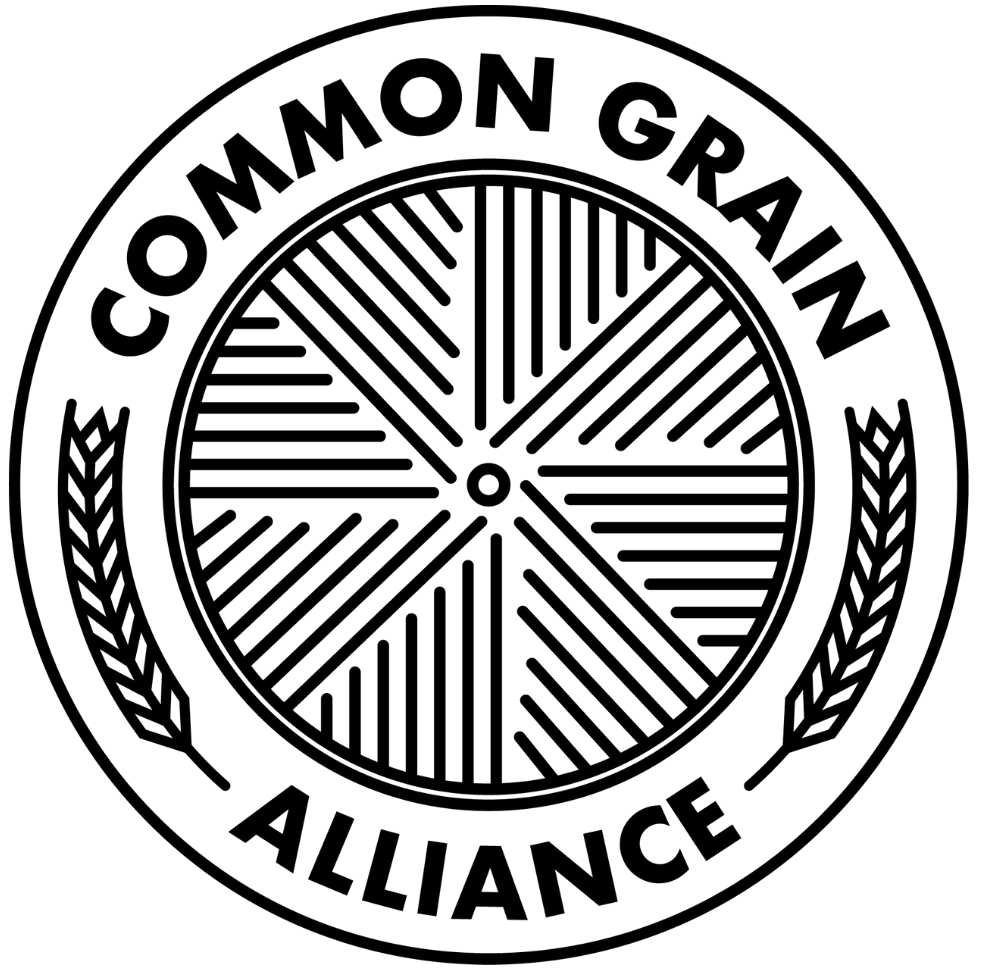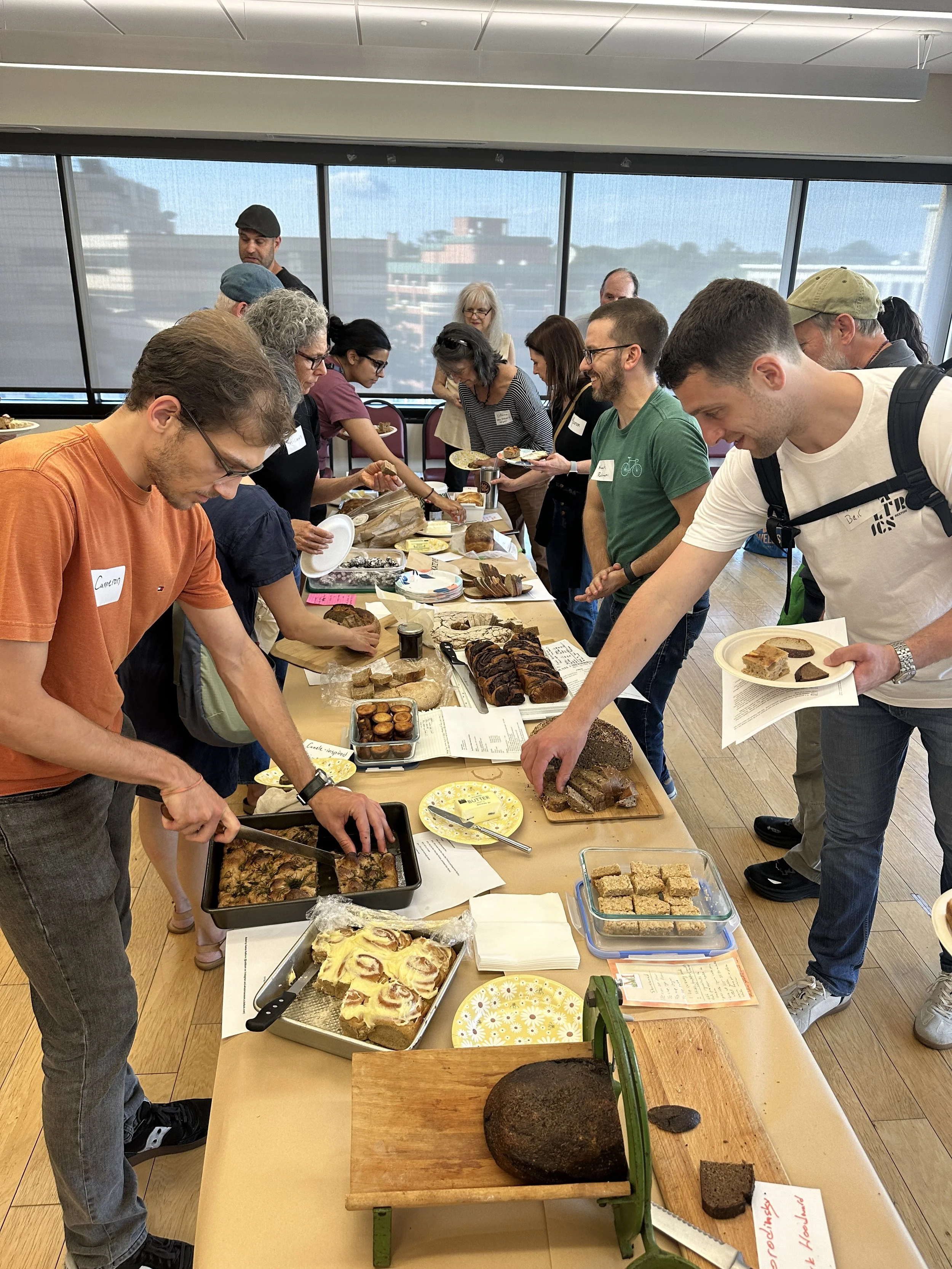
Our Projects
We work on challenges throughout the regional grain supply chain to help farmers, processors, and end users grow, process, access, and utilize more high quality, local grain.
Value Chain Coordination
Annual Conference and Quarterly Meetings
Common Grain Alliance was founded in 2018 as nonprofit with a mission of connecting grain farmers, processors, and grain artisans to build a vibrant, equitable, regenerative, and integrated regional grain economy in the Mid-Atlantic. Connecting stakeholders along the regional grain value chain is still the heart of what we do. We facilitate a network of 140+ farmers, millers, maltsters, bakers, brewers, chefs, researchers, and other grain enthusiasts who connect online and in-person. We gather for quarterly events around the Mid-Atlantic region to network and share knowledge around topics related to farming, processing, and utilizing grain. In 2023, we hosted our first-ever annual Mid-Atlantic Grain Conference, bringing together 150+ regional grain value chain stakeholders for a day of educational sessions, workshops, networking, and sharing local grain products. We look forward to our conference becoming an annual gathering.
Find out about upcoming events here.
Find out more about becoming a member of Common Grain Alliance here.
Learn more about the 2025 Mid-Atlantic Grain Conference here.
Annual Membership Survey
Read the Executive Summary of the 2024 Common Grain Alliance Membership Survey
In 2024, we established an annual member survey to gather insights on the regional grain supply and demand, inform CGA members' business planning, understand the needs of Mid-Atlantic grain stakeholders, and track the growth of the regional grain network over time. A major challenge in building regional grain economies is the lack of comprehensive data on production of regenerative food-grade grain for regional markets and regional grain markets/demand. This makes it difficult for businesses to make informed decisions and for regional grain advocates to effectively promote the industry. This survey helps fill that gap by providing critical insights directly from members. The data collected by the survey will be used to help guide CGA’s strategy and inform policymakers, consumers, and partners about the needs and progress of our efforts to grow the Mid-Atlantic regional grain economy.
We want to extend a thank you to the Artisan Grain Collaborative, who graciously shared their membership survey for us to adapt and utilize. This survey is adapted from the Artisan Grain Collaborative’s Annual Member Survey. Our hope is that by using the same survey questions, we can work towards building a broader set of information about regional grain efforts across the country.
Farmer Resources
The consolidation of grain production in the Midwest at the end of the 19th century led to a sharp decline in food-grade grain production in other regions of the U.S.. This led to the abandonment of mills and other grain processing infrastructure, and a loss of knowledge about how to grow grain for food supply chains. There is still plenty of grain grown for commodity, feed, and seed markets in the Mid-Atlantic region, typically with significant fertilizer, pesticide, and fungicide inputs. Our goal is to re-build the knowledge about how to sustainably grow food-grade grain for the regional food system using organic or low-input farming methods. We also bring in new knowledge and innovative approaches that can help growers operate profitable farms while building soil health, sequestering carbon, and stewarding the land for future generations.
The Growing Grain Handbook and other Educational Resources for Farmers
We developed the Growing Grain Handbook to address the educational barriers to growing grain for the local market. New and experienced farmers growing on the small- to mid-scale can refer to these documents, educational videos, and blog posts for key considerations for incorporating grains into their businesses and learn more about techniques used to support big picture success. The Growing Grain Blog and Video Series explores these themes through more specific questions growers might encounter. The development of the Growing Grain Handbook was funded by a Sustainable Agriculture Research and Education (SARE) grant.
Sustainable Agriculture Field Days and Webinars
We regularly host in-person field days and online educational webinars and meetings for farmers to share knowledge about growing grain in the region, troubleshoot issues, and learn from innovative experts and researchers about cutting-edge techniques related to regenerative agriculture. These events and opportunities can be found on our Events Page.
Leadership Skill Training for Veterans and Farmers of Color
With our partners, Future Harvest CASA, Fields 4 Valor, and the Million Acre Challenge, we are helping to design and implement a tailored, culturally sensitive training program to advance minority farmers’ access to land and resources. Each training cohort consists of nine months of free, multi-modal training (including classroom curricula, on-farm and online learning, and one-on-one mentorship). Through the Initiative, socially disadvantaged beginning farmers can access enhanced training, education, and mentorship, enabling these farmers to master skills needed to advance their careers and run a successful and profitable farming operation
Infrastructure Development
There is a growing demand for local, organic grain among consumers and businesses looking to enhance their sourcing and consumption of local food products. However, rural grain farmers and other grain businesses face challenges with grain storage capacity and access to cleaning equipment, and affordable transportation that hinders their ability to meet the rising demand. Small and medium-sized grain farmers and grain processors often don’t have the resources to invest in expensive infrastructure improvements. To address these challenges, many farmers in the CGA network share grain processing equipment such as seed cleaners and mills.
Regional Grain Supply Chain Assessment
We are partnering with FoodWorks Group to conduct a regional grain supply chain assessment and develop a viable plan for meeting grain cleaning, storage, and distribution infrastructure gaps. This project will (1) identify the barriers and gaps in the current grain supply chain, (2) explore and propose solutions and their potential impacts, and (3) analyze and develop a plan that is feasible for Common Grain Alliance to pursue to address these needs. This work will provide valuable information that will help us make the case for increased investment in regional grain production and processing. It will lay the foundation for future investments to increase capacity and catalyze development of the regional grain supply chain. This project is funded by a Virginia USDA Rural Business Development Grant.
Market Access and consumer education
Over the past decade, a robust and prolific local food movement has occurred, driving increased consumer awareness and concern about where food comes from and the growing practices involved. Consumer trends to “buy local” and “support local farmers” have contributed to strong and consistent demand for local food. However, consumers tend to think of local food as fruits and vegetables, and increasingly meat and dairy. Regional grains, despite being a culturally important staple food, a sizable percentage of the daily diet, and a large part of agriculture production, are left out of the local food narrative. We are working to change this dynamic through several programs focusing on expanding market access and consumer education for regional grains.
Mid-Atlantic Grain Stand
In 2021, CGA and FRESHFARM received a Farmers Market Promotion Program Grant to pilot the Mid-Atlantic Grain Stand and Grain Share. This innovative model established a new, direct-to-consumer market channel for sourcing, aggregating, and distributing local grains from CGA members. With this grant, we established a new supply chain for local grain, aggregating local grains from 11 CGA growers and processors and bringing them to four weekly farmers markets in the D.C. area. We also established a CSA-style Grain Share program, which distributed 989 grain shares to CSA customers in 2023 and 2024. This successful pilot has sold over $75,000 in local grains through 25,139 transactions, demonstrating interest in local grains from D.C. area farmers market consumers. This project aims to increase the presence of and demand for regional grains at Mid-Atlantic farmers markets. Our goal is to raise awareness of regional grains and create a measurable impact on sales for growers and vendors who incorporate regional grains in their products. Read more about the Mid-Atlantic Grain Stand Program here.
Baker Meet Ups
Baker meet ups are an opportunity for professional and home bakers to come together and share bakes and information about baking with local grains. We typically line up a CGA member baker to give a talk about their approaches and learning about utilizing local grain in their baking, and then enjoy the baked goods everyone has brought. Find out about upcoming Baker Meet Ups on our Events Page.
Consumer Educational Resources
We produce educational resources for consumers that expand awareness of regional grain, share recipes and technique for cooking and baking with regional grain, and help connect consumers to local businesses who sell regional grain. These resources can be found on the:




















